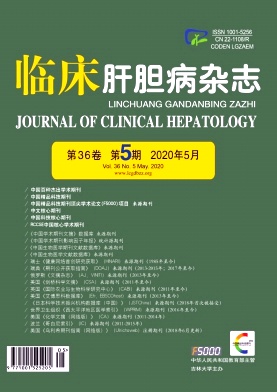|
[1] WU L, ZHANG J, SUN L, et al. Clinical analysis of 70 cases of Klebsiella pneumoniae liver abscess[J]. Chin J Infect Chemother, 2018, 18(1):11-17.(in Chinese)吴柳,张洁,孙琳,等.肺炎克雷伯菌肝脓肿70例临床分析[J].中国感染与化疗杂志,2018, 18(1):11-17.
|
|
[2] SIU LK, YEH KM, LIN JC, et al. Klebsiella pneumoniae liver abscess:A new invasive syndrome[J]. Lancet Infect Dis,2012, 12(11):881-887.
|
|
[3] FANG CT, LAI SY, YI WC, et al. Klebsiella pneumoniaegenotype K1:An emerging pathogen that causes septic ocular or central nervous system complications from pyogenic liver abscess[J]. Clin Infect Dis, 2007, 45(3):284-293.
|
|
[4] FUNG CP, LIN YT, LIN JC, et al. Klebsiella pneumoniae in gastrointestinal tract and pyogenic liver abscess[J]. Emerg Infect Dis, 2012, 18(8):1322-1325.
|
|
[5] YU WL, LEE MF, CHEN CC, et al. Impacts of hypervirulence determinants on clinical features and outcomes of bacteremia caused by extended-spectrumβ-lactamase-producing klebsiella pneumoniae[J]. Microb Drug Resist, 2017, 23(3):376-383.
|
|
[6] LI J, ZHAO JM, TANG YQ, et al. Invasive Klebsiella pneumoniae liver abscess syndrome:A report of two cases and literature review[J]. J Clin Hepatol, 2019, 35(3):613-616.(in Chinese)李晶,赵杰敏,唐沂迁,等.侵袭性肺炎克雷伯菌肝脓肿综合征2例报告并文献复习[J].临床肝胆病杂志,2019, 35(3):613-616.
|
|
[7] WANG Q, GE YM, LIU JF, et al. Antimicrobial resistance and virulence genotypes epidemiological analysis of hypermucoviscous Klebsiella pneumoniae isolates in the liver abscess disease[J]. Chin J Nosocomiol, 2016, 26(24):5531-5533,5586.(in Chinese)汪强,葛玉梅,刘建芳,等.肝脓肿高毒力肺炎克雷伯菌耐药性及毒力基因型流行性分析[J].中华医院感染学杂志,2016, 26(24):5531-5533, 5586.
|
|
[8] WANG CY, QIU HB, PENG H. Analysis on biological characteristics and drug resistance situation of Klebsiella pneumoniae liver abscess[J]. Int J Lab Med, 2017, 38(21):2955-2957.(in Chinese)王春燕,邱厚兵,彭胡.肺炎克雷伯菌肝脓肿微生物学特征和耐药情况分析[J].国际检验医学杂志,2017, 38(21):2955-2957.
|
|
[9] HUANG Y, ZHANG WH. Research advances in diagnosis and treatment of bacterial liver abscess[J]. J Clin Hepatol, 2018,34(3):641-644.(in Chinese)黄洋,张伟辉.细菌性肝脓肿的诊治进展[J].临床肝胆病杂志,2018, 34(3):641-644.
|
|
[10] ROSSI B, GASPERINI ML, LEFLON-GUIBOUT V, et al. Hypervirulent Klebsiel a pneumoniae in cryptogenic liver abscesses,Paris, France[J]. Emerg Infect Dis, 2018, 24(2):221-229.
|
|
[11] WU H, LI D, ZHOU H, et al. Bacteremia and other body site infection caused by hypervirulent and classic Klebsiella pneumoniae[J]. Microb Pathog, 2017, 104:254-262.
|
|
[12] FANG CT, LAI SY, YI WC, et al. The function of wzy-k1(magA), the serotype K1 polymerase gene in Klebsiella pneumoniae cps gene cluster[J]. J Infect Dis, 2010, 201(8):1268-1269.
|
|
[13] ZHOU W, HUANG WF. Research update on hypervirulent Klebsiella pneumoniae[J]. Chin J Infect Chemother, 2016, 16(6):800-803.(in Chinese)周薇,黄文芳.高毒力肺炎克雷伯菌的研究进展[J].中国感染与化疗杂志,2016, 16(6):800-803.
|
|
[14] STRUVE C, BOJER M, NIELSEN EM, et al. Investigation of the putative virulence gene magA in a worldwide collection of495 Klebsiella isolates:magA is restricted to the gene cluster of Klebsiella pneumoniae capsule serotype K1[J]. J Med Microbiol, 2005, 54(Pt 11):1111-1113.
|
|
[15] XU SB, JIN JL. Molecular pathogenesis of hypervirulent Klebsiella pneumoniae[J]. J Microbes Infect, 2017, 12(5):320-326.(in Chinese)徐水宝,金嘉琳.高毒力肺炎克雷伯菌的分子致病机制[J].微生物与感染,2017, 12(5):320-326.
|
|
[16] GUO Y, WANG S, ZHAN L, et al. Microbiological and clinical characteristics of hypermucoviscous Klebsiella pneumoniae isolates associated with invasive infections in China[J]. Front Cell Infect Microbiol, 2017, 7:24.
|
|
[17] YE M, TU J, JIANG J, et al. Clinical and genomic analysis of liver abscess-causing Klebsiella pneumoniae identifies new liver abscess-associated virulence genes[J]. Front Cell Infect Microbiol, 2016, 6:165.
|
|
[18] ZHANG R, LIN D, CHAN EW, et al. Emergence of carbapenem-resistant serotype K1 hypervirulent klebsiella pneumoniae strains in China[J]. Antimicrob Agents Chemother, 2016, 60(1):709-711.
|







 DownLoad:
DownLoad: